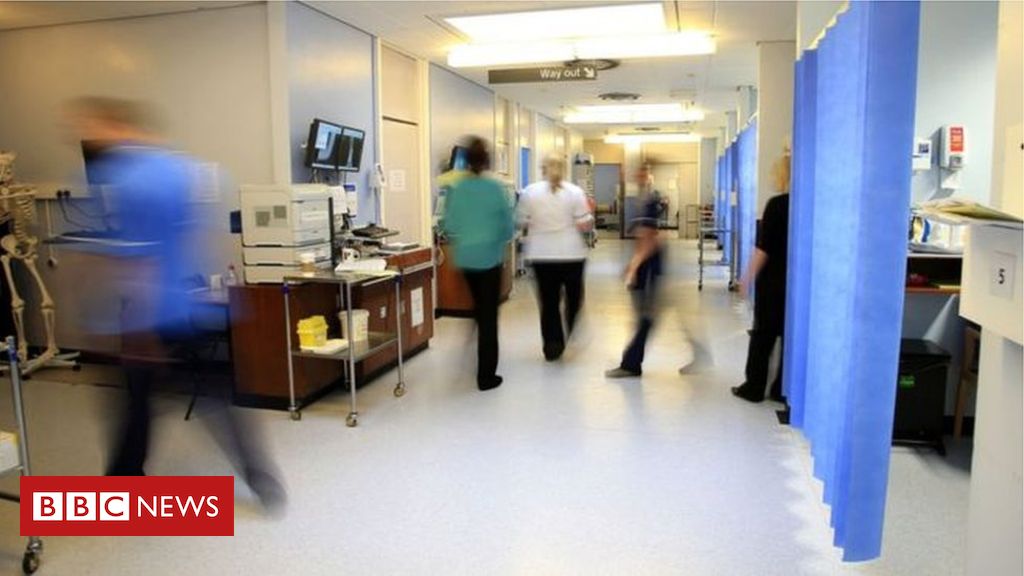Image copyright
PA Media
Health workers across Northern Ireland are staging industrial action
The South Eastern Health Trust has said a number of services will be disrupted next week due to ongoing strike action by health workers.
On Wednesday, all routine outpatient appointments at the Ulster Hospital have been cancelled apart from Maternity and Children’s Services.
On Monday, there will be no catering or transport to and from day centres.
A number of outpatients departments will also be closed next Friday afternoon.
The trust is advising that patients check their website or social media for updates.
‘Extremely sorry’
Earlier, the Belfast Trust announced it had cancelled all outpatient appointments and planned surgery for Monday, Tuesday and Thursday.
The Belfast Trust said it was “extremely sorry for the disruption and distress” the cancellations will cause to patients and their families.
It said appointments would be rebooked at a later date.
Health workers across Northern Ireland are staging industrial action in protest at pay and staffing levels which they claim are “unsafe”.
The chief executive of Belfast Health Trust, Martin Dillon, said more than 10,000 patients will be affected by the cancellation of outpatient appointments over three days next week.
Speaking on the BBC’s Evening Extra programme, he also confirmed that “about 1,000 elective procedures” had to be cancelled.
He apologised to people who have already been waiting for long periods for surgery but said the decision was taken due to safety concerns.
“The scale and the scope of industrial action we’re facing is such that we have to stand down these services in the interests of patient safety,” Mr Dillon said.
Belfast Trust Chief Executive Martin Dillon apologised to patients affected by the cancellations
All outpatient appointments; planned surgery; planned admissions and day case procedures have been cancelled on Monday 2 December; Tuesday 3 December and Thursday 5 December at the following hospitals and health centres:
- Royal Victoria Hospital
- Children’s Hospital
- Royal Jubilee Maternity Hospital
- School of Dentistry
- Belfast City Hospital
- Mater Hospital
- Musgrave Park Hospital
The trust said that on Wednesday 4 December, all outpatient services “will run as normal” but all planned surgeries; planned admissions and day case procedures are still postponed.
The trust added that at the moment, it “anticipated that all services will be delivered as normal” by Friday 6 December.
Full details and advice for patients has been published on the trust’s website.
The cancellations come a day after official figures showed patient waiting times in Northern Ireland have reached an all-time high.
More than 300,000 people are waiting for a first appointment with a consultant, according to statistics from the Department of Health.
Last week, a number of non-emergency operations across Northern Ireland had to be suspended due to staff shortages.
‘Deep-seated anger’
On Friday afternoon, the man leading the Department of Health appealed for strikes to be “paused” due to the “extremely fragile state” of Northern Ireland’s health service.
Richard Pengelly said emergency departments were already under pressure, waiting times were “disturbing” and winter-related illnesses were compounding problems.
“My appeal to unions is simply this – please don’t allow a bad situation to become worse,” he said.
Richard Pengelly is Northern Ireland’s permanent health secretary
Mr Pengelly said he fully understood and shared the “deep-seated anger and frustration of staff” who are dealing with “escalating problems” in the health service.
However, he said that the Department of Health “does not have the budget or the authority to meet union demands on pay for this year”.
He said the “ultimate resolution to this dispute rests with ministers”.
Northern Ireland does not have any locally-elected ministers as Stormont’s devolved government has not functioned in almost three years.
‘2,500 vacancies’
Civil servants are running public services and Mr Pengelly is overseeing health services in his role as permanent secretary of the Department of Health.
Unison, which represents about 25,000 healthcare workers, is seeking pay parity with NHS staff in the rest of the UK, arguing they have lost out on pay rises
It has also said that in nursing alone there are nearly 2,500 vacant posts in Northern Ireland and has described staffing levels as “unsafe”.
Image copyright
Pacemaker
Unison workers took strike action at Belfast’s Mater Hospital earlier this week
Nurses are set to stage their own industrial action next week after members of the Royal College of Nursing (RCN) voted to strike for the first time in its 103-year history.
Nurses will refuse to work unpaid hours or do any task that is not patient-specific on 3 December, building to a 12-hour strike on 18 December.
Royal College of Nursing director Pat Cullen insisted the Belfast Trust’s statement was “disrespectful to nurses who have raised patient safety issues for years”.
She added: “Our nurse members will be on duty every day next week ready to provide outpatient, elective care services and emergency care for patients.
“All nurses are not doing next week is non nursing, non paid tasks and concentrating on their patients who now have been told not to turn up for services. So who will our nurse members on duty care for? This is so disrespectful to nurses.”
‘Misunderstandings’
Mr Pengelly has written to staff across the health and social care system “urging them to think again” and asking them to enter into “an independent conciliation process”.
He also said he wanted to “correct misunderstandings” about the health workers’ dispute.
The permanent secretary said his department “has not received enough money through the Barnett formula to replicate England’s health pay settlement”.
The Barnett formula is a system of government grants which dictates the level of public spending in Scotland, Wales and Northern Ireland and is linked to population size.
Mr Pengelly said Northern Ireland’s funding allocation would always fall short “because our workforce includes social work and social care employees and is therefore proportionately much larger than England’s”.
He added the latest statistics showed that nursing and midwifery vacancies in England were “at the same level as Northern Ireland”.

















